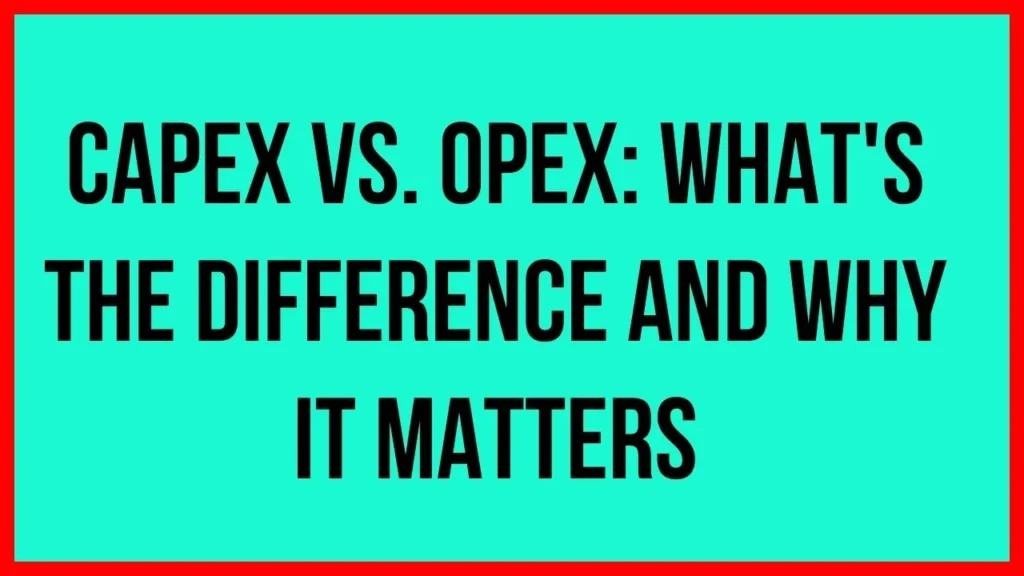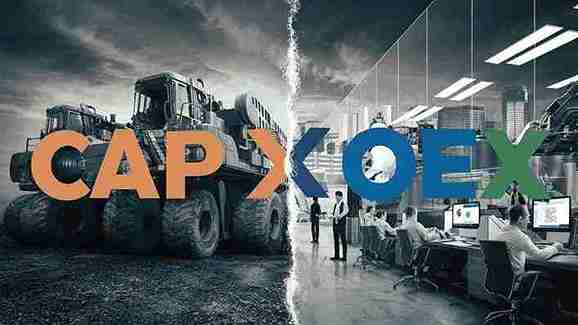CapEX Vs. OpEX: What’s the Difference and Why It Matters
CapEX Vs. OpEX: What’s the Difference and Why It Matters
Introduction:
In the world of finance and business management, two essential terms often come into play: Capital Expenditure (CapEX) and Operational Expenditure (OpEX). Understanding the distinctions between these two types of expenditures is crucial for businesses, as it directly impacts financial planning, budgeting, and overall business strategy. This article delves into the differences between CapEX and OpEX, elucidating their significance and the implications for businesses.
Defining CapEX and OpEX:
a. Capital Expenditure (CapEX):
Capital Expenditure refers to the funds a company invests in acquiring, upgrading, or maintaining physical assets with a long-term utility. These assets can include property, machinery, equipment, or any other tangible asset that contributes to the company’s ability to generate revenue over an extended period.
b. Operational Expenditure (OpEX):
Operational Expenditure, on the other hand, encompasses the day-to-day expenses required to keep a business running smoothly. This includes costs associated with rent, utilities, salaries, office supplies, and other routine operational expenses. OpEX is generally incurred in the normal course of business and is considered a short-term expense.

Distinguishing Characteristics:
a. Time Horizon:
One of the primary distinctions between CapEX and OpEX lies in the time horizon. CapEX involves long-term investments with benefits expected to be realized over several years. In contrast, OpEX represents ongoing, short-term costs incurred to sustain daily business operations.
b. Nature of Expenditure:
CapEX involves expenditures that enhance the company’s overall capacity or efficiency, often resulting in increased future benefits. OpEX, on the other hand, maintains the status quo by covering regular, recurring expenses necessary for day-to-day business activities.
Financial Reporting and Tax Implications:
a. CapEX:
Capital expenditures are typically capitalized on the balance sheet and depreciated or amortized over their useful life. This allows businesses to spread the cost of the asset over time, reflecting its gradual consumption. The tax implications for CapEX involve depreciation deductions, which can be advantageous for tax planning.
b. OpEX:
Operational expenditures are expensed immediately and do not appear as assets on the balance sheet. This immediate expensing affects the company’s net income directly, impacting profitability in the short term. However, OpEX is deductible in the year it is incurred, providing immediate tax benefits.
Strategic Implications:
a. CapEX:
Capital expenditures are strategic decisions that impact a company’s future growth and competitiveness. Investments in technology, infrastructure, or expansion projects can position a business for long-term success and increased market share.
b. OpEX:
Operational expenditures are integral to maintaining day-to-day business operations. Effective management of OpEX is crucial for ensuring business continuity, managing cash flow, and responding to short-term market fluctuations.
Risk and Flexibility:
a. CapEX:
Capital expenditures carry a higher degree of risk due to their long-term nature. Changes in market conditions or technology may impact the expected returns on these investments. Companies need to carefully evaluate the risk-reward balance before committing to significant capital projects.
b. OpEX:
Operational expenditures provide businesses with greater flexibility. Since they are incurred regularly, companies can quickly adapt to changing market conditions by adjusting their operational expenses without being tied to long-term commitments.
Conclusion:
In summary, understanding the distinctions between Capital Expenditure and Operational Expenditure is vital for effective financial management and strategic decision-making. While CapEX lays the foundation for future growth and competitiveness, OpEX ensures the day-to-day functioning of a business. Striking the right balance between these two types of expenditures is key to achieving financial stability and sustainable business success. Businesses that grasp the nuances of CapEX and OpEX can make informed decisions that align with their overall strategic objectives.
1. What is the primary difference between CapEX and OpEX?
Answer: The main distinction lies in the time horizon and nature of expenditure. Capital Expenditure (CapEX) involves long-term investments in physical assets, while Operational Expenditure (OpEX) covers day-to-day, short-term costs for ongoing business operations.
2. Can you provide examples of CapEX and OpEX?
Answer: Examples of CapEX include purchasing machinery, acquiring property, or investing in technology for long-term benefits. Operational Expenditure includes routine expenses like rent, utilities, salaries, and office supplies necessary for daily business operations.
3. How are CapEX and OpEX treated in financial reporting?
Answer: Capital expenditures are capitalized on the balance sheet and depreciated over time. Operational expenditures are expensed immediately and do not appear as assets on the balance sheet. This difference impacts how they contribute to a company’s financial statements.
4. What are the tax implications of CapEX and OpEX?
Answer: CapEX provides depreciation deductions over time, offering long-term tax benefits. Operational expenditures are deductible in the year they are incurred, providing immediate tax advantages for businesses.
5. How do CapEX and OpEX impact a company’s strategic decisions?
Answer: Capital expenditures are strategic, influencing long-term growth and competitiveness. Operational expenditures are integral for daily operations and maintaining business continuity, contributing to short-term stability.
6. Are there risks associated with CapEX and OpEX?
Answer: Capital expenditures carry higher risk due to their long-term nature, with potential impacts from market changes or technology advancements. Operational expenditures offer greater flexibility, allowing businesses to adapt quickly to market fluctuations.
7. How do businesses manage the balance between CapEX and OpEX?
Answer: Businesses need to strike a balance by aligning their capital investments with long-term growth goals while efficiently managing operational expenses to ensure day-to-day functioning and adaptability to market changes.
8. Can CapEX and OpEX be adjusted based on market conditions?
Answer: CapEX involves long-term commitments and may be less adaptable to short-term market changes. Operational expenditures, being regular and recurring, offer businesses the flexibility to adjust quickly to evolving market conditions.
9. Why is it crucial for businesses to understand the difference between CapEX and OpEX?
Answer: Understanding the distinction is vital for effective financial management and strategic decision-making. It enables businesses to make informed choices that align with their overall objectives, balancing long-term growth with day-to-day operational needs.
10. How do CapEX and OpEX contribute to a company’s overall financial health?
Answer: Capital expenditures lay the foundation for future success and competitiveness, while operational expenditures ensure immediate business continuity. Striking a balance between the two types of expenditures is key to achieving financial stability and sustainable business success.

